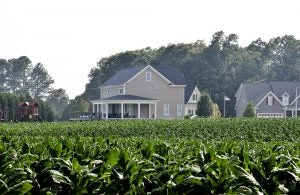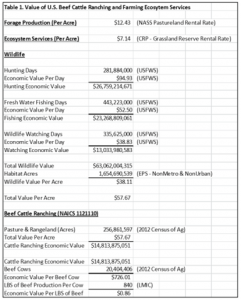Wide-open spaces — it’s a line The Chicks made popular but that makes me think of all agriculture has to offer. When I think of cities, I don’t particularly think of wildlife, except those scrounging for scraps or those that become roadkill. However, when I think of farming, I think of significant amounts of wildlife benefiting from the wide-open spaces held for them.
Over 69 million acres of land are considered “urban” areas, and although this is just over 3.5 percent of U.S. land, it still makes a significant impact on the surrounding areas and environment. We’re adding about a million acres of urban area every single year, covering land in concrete and taking away vital food sources and habitat for wildlife.
This is where agriculture comes in and saves the day.

Nearly 1.6 billion acres of land are used for pasture/rangeland, forestry, and cropland in the United States. These large stretches of land provide habitat, corridors to move from territory to territory, and areas to escape human interaction. On top of providing open spaces, agricultural areas also provide food sources for wildlife; much to the dismay of farmers, but it’s a part of the gig.
Natural vegetation is present on almost every single agricultural operation. Inevitably there are areas that cannot be farmed, whether it be because of ground conditions (like wetlands) or dead corners where equipment can’t reach. In these areas, native vegetation has an opportunity to thrive. Sections of land like this are so important for wildlife and our ecosystem as a whole.
Don’t think of just large animals like deer — even the tiniest insects like bees significantly benefit from native corridors.
Ecosystem services is the value that operations provide to our environment for simply existing and operating in a positive manner. These services can be grouped into four categories: provisioning, regulation, supporting, and cultural. Operations can provide food and water to wildlife, control climate and disease, support nutrient cycles or pollination, or have recreational benefits. All of these services benefit our environment locally, regionally, and even nationally as they are all interconnected.
It is somewhat difficult to place a measurable benefit, like monetary dollars, on these services, but the National Cattlemen’s Beef Association has calculated some value that ranching provides across America.
Ranching alone provides an estimated $14 billion+ every year in economic value to the country. This value includes monetary allotments for hunting days, fishing days, wildlife viewing, and habitat. That’s $14 billion that will never be paid to ranchers; it’s what they provide, free of charge, to the American ecosystem. For every pound of beef produced, $0.86 of ecosystem services is provided. And this is just for beef ranching — this number increases significantly if you add in the benefits provided by forestry, croplands, specialty crops, other livestock operations, and all the other agricultural entities.

Ecosystem services are not simply related to providing for wildlife, there is a deep connection in the benefits of growing food, fuel, and fiber and our climate and environment. Agriculture has the opportunity to clean air in local regions as growing plants remove carbon dioxide from the air and release oxygen. Soil and air contaminants are filtered with growing plants and areas with previous low or zero productivity can be improved to thriving environments with the introduction of agriculture. There are so many variables that can be positively impacted by farming and ranching, and sometimes this is the only way to make these impacts while also providing benefits and services to human life.
We consistently remind you to thank a farmer when you sit down to eat, but truly we should be thanking agriculturalists for nearly every aspect of our lives. It is because of agriculture, the backbone of our society, that we are able to succeed in the ways that we do. Agriculture provides for us beyond measure.
Michelle Miller, the “Farm Babe,” is an internationally recognized keynote speaker, writer, and social media influencer and travels full time to advocate for agriculture. She comes from an Iowa-based row crop and livestock farming background and now resides on a timber farm in North Central Florida.



